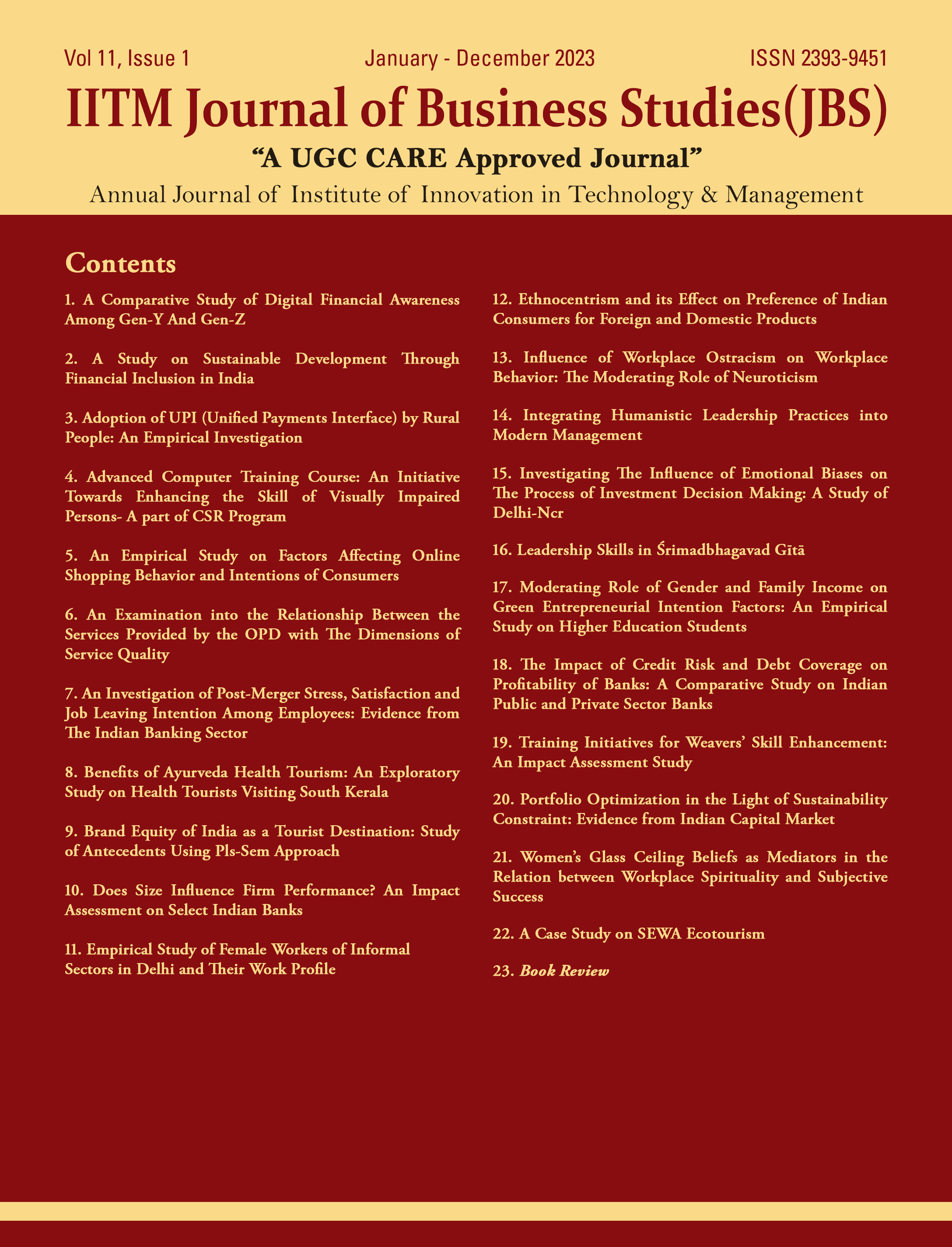COMPANY BOARDS AND THEIR IMPACT ON CORPORATE GOVERNANCE: EMPIRICAL EVIDENCE FROM INDIA & SINGAPORE
Keywords:
Corporate Governance, Stakeholders, Board of Directors, India, SingaporeAbstract
Corporate Governance has taken center stage in the last few decades in developed as well as developing economies. Corporate Governance is the guiding principle, which determines how companies should be managed to take care of all its stakeholders. Governance of any company is primarily entrusted on its Board of Directors (BODs) or The Board. The main objective of this paper is to study the state of Corporate Governance in India and Singapore, with special emphasis on Corporate Governance aspects related to Boards. A customized questionnaire was deployed to collect primary data for the analysis. The findings reported in the paper are based on analysis conducted on empirical data collected from selected corporate executives from both countries, from diverse industrial segments. Descriptive statistics has been used to present the perception of the participants concerning the proliferation of the corporate governance code parameters related to Board of directors, in the companies across India and Singapore. The study observed that the proliferation of corporate governance codes parameters related to Board of Directors, in the companies across India and Singapore significantly differed in terms of board composition, board development, accountability of the board of directors, remuneration committee, audit committee, risk assessment committee, CSR committee. However, there are still some gaps that need to be bridged.
References
Adams, R. B., Hermalin, B. E., & Weisbach, M. S. (2010). The role of boards of directors in corporate governance: A conceptual framework and survey. Journal of Economic Literature, 48(1), 58-107. 2. Aina, K. (2013). Board of directors and corporate governance in Nigeria. International Journal of Business and Finance Management Research, 21-34
Andres, P. D., & Vallelado, E. (2008). Corporate governance in banking: The role of the board of directors. Journal of Banking and Finance, 32(12), 2570-2580.
Ayuso, S., & Argandoña, A. (2009). Responsible corporate governance: towards a stakeholder board of directors? IESE Business School Working Paper No. 701, Available at SSRN: https://ssrn.com/ abstract=1349090 or http://dx.doi.org/10.2139/ssrn.1349090
Baysinger, B. D., & Butler, H. N. (1985). Corporate governance and the board of directors: Performance effects of changes in board composition. Journal of Law, Economics, and Organization, 1(1), 101-124. 6. Bhagat, S., & Black, B. (1999). The Uncertain Relationship Between Board Composition and Firm Performance. The Business Lawyer, 921-963.
Chakrabarti et al. (2009). Corporate Governance in India (pp. 151-176). Columbia University Press. 8. Charan, R. (2005). Boards that deliver: Advancing corporate governance from compliance to competitive advantage (Vol. 20). John Wiley & Sons.
Cossin, Didier & Caballero, José. (2014). The Four Pillars of Board Effectiveness. DOI: 10.1002/9781119615705.ch1.
Crawford, C. J. (2007). The Reform of Corporate Governance: Major Trends in the U.S. Corporate Boardroom, 1977–1997. Capella University.
Dharmapala et al. (2011). Corporate governance, Enforcement, and Firm Value: Evidence from India (23 June 2011). University of Michigan Law and Economics, Olin Working Paper No. 08-005; 12. Fama, E., & Jensen, M. (1983). Separation of Ownership and Control. The Journal of Law and Economics, 26(2), 301-325.
Fan, P. S., (2004). Empirical Research on CG, Monetary Authority of Singapore (MAS). 14. https://www.spencerstuart.com/
Irani, J. J. (2005). Report of the Expert Committee to Advise the Government on the New Company Law.
John, K., & Senbet, L. W. (1998). Corporate governance and board effectiveness. Journal of Banking & Finance, 22(4), 371-403.
Kaplan, S. N. (2012). Executive Compensation and Corporate Governance in the U.S.: Perceptions, Facts and Challenges, Chicago Booth Paper No. 12-42, Fama-Miller Centre for Research in Finance, Chicago, July 2012
Khanna, T., & Palepu, K. G. (2004). Globalization and convergence in corporate governance: Evidence from Infosys and the Indian software industry. Journal of International Business Studies, 35(6), 484-507. 19. Khanna, V. (2009). Law Enforcement and Stock Market Development: Evidence from India. Paper prepared for the Law and Economy in India Project at the Center on Democracy, Development, and The Rule of Law.
Koh, J., & Yip, A. The evolution of Corporate Governance in Singapore.
L’Huillier, B.M. (2014). What does CG actually mean? Corporate Governance, 14(3), 300-319. Emerald Group Publishing Limited. ISSN 1472-0701.
Lee, J., & Shailer, G. (2008). The Effect of Board Related Reforms on Investors Confidence. Australian Accounting Review, 18(2), 123-134.
Lorsch, J. W. and MacIver, E. (1989). Pawns or Potentates: The Reality of America’s Corporate Boards. Harvard University Graduate School of Business Administration, Boston.
Mukherjee, D., & Ghosh, T. (2004). An Analysis of Corporate Performance and Governance in India: Study of Some Selected Industries, Discussion Paper 04-19
Naciti, V. (2019). Corporate governance and board of directors: The effect of a board composition on firm sustainability performance. Journal of Cleaner Production, 237, 117727.
Robertson, C., Diyab, A. & Al-Kahtani, A. (2013). A cross-national analysis of perceptions of corporate governance principles. International Business Review, 22(1), 315-325.
Sarkar, J. (2009). Board independence & corporate governance in India: Recent trends and challenges ahead. Indian Journal of Industrial Relations, 44(4), 576-592.
Securities and Exchange Board of India (2004). Circular no. SEBI/CFD/DIL/CG/1/2004/12/10 dated 29 October.
Shailer, G. (2004). An Introduction to Corporate: Governance in Australia. Pearson Education Australia. 30. Shleifer, A., & Vishny W. (1997). A Survey of Corporate Governance. Journal of Finance, 52(2), 737. 31. Sonnenfeld, J. A. (2002). What makes great boards great? Harvard Business Review, 80(9), 106-113. 32. Srinivasan, P., & Srinivasan, V. (2011). Status of Corporate Governance Research in India: An
exploratory study. Working Paper # 334. IIM Bangalore
The Companies Bill, 2013
The Confederation of Indian Industry (CII) (1998) after detailed consultation among its members, released in April, the final report entitled Desirable Corporate Governance A Code (CII Code). 35. Third Annual Conference on Empirical Legal Studies Papers.
US Congress. Sarbanes-Oxley Act of 2002, Title VIII
Varma, J. R. (1997). Corporate Governance in India: Disciplining the Dominant Shareholder. IIMB Management Review, 9(4), 5-18.

